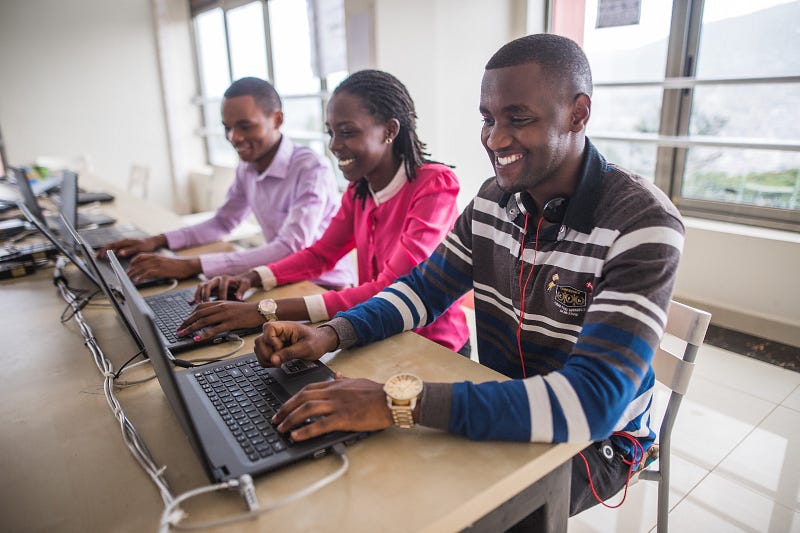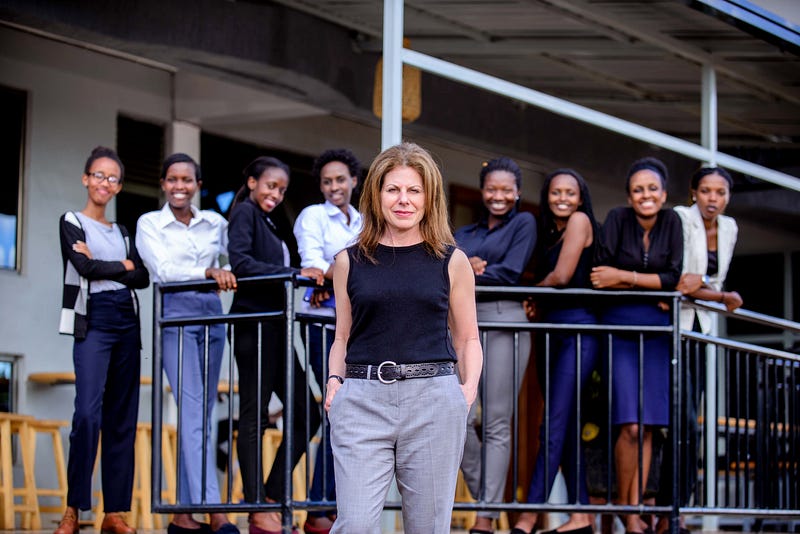Why We’re Expanding Access to Men
How Gender Inclusivity in the Classroom Benefits Students, Communities, and Economies
By: Karen Sherman, President, Akilah
According to the World Economic Forum, the African continent will be home to over a billion young people by 2050. By 2035, the number of Africans joining the workforce will exceed that of the rest of the world combined. In Rwanda alone, more than 70 percent of the population is under the age of 30. Rwandan youth represent both a significant opportunity and a potential risk to the country’s continued growth and advancement.
Rwanda, now the second fastest growing economy in Africa, needs an educated workforce to continue to develop as a middle income country. And yet in Rwanda, and across the region, there is limited access to affordable, high-quality tertiary education that focuses on preparing students for future careers. The issue affects men and women alike. Graduates from African universities spend an average of five years searching for a job. Millions are out of work or underemployed, but employers leave jobs unfilled because they can’t find qualified talent.
The harsh reality is that East African education systems were built for the 20th century and are failing students, largely because global education systems were built for the 20th century. These outdated systems pose a serious threat, not just in Rwanda and Africa but around the globe. Youth unemployment and underemployment contribute greatly to economic and political instability in many countries. And the gap between graduates’ skills and employer needs will only grow without a radical redesign of education.
It’s one reason Akilah chose to expand access to our transformative higher education model to men through Davis College, while maintaining Akilah as a women’s Institute at Davis College. There are others as well.
Gender inclusivity is good for women. “Visionary men have long been public champions and behind the scenes dealmakers for the cause of women’s inclusion. Today we need them more than ever,” said Ambassador Melanne Verveer and Kim Azzarelli, Chair of Cornell Law School’s Avon Global Center for Women and Justice. Davis College’s gender inclusive campus will have an intentional focus on women’s leadership as a key tenet of our competency-based, blended curriculum across all academic programs. Faculty and student sensitization on gender balanced classrooms and co-curriculars, and bringing men in as allies, will ground our learning community and culture at Davis College.

Global studies suggest that working with men to address discriminatory gender norms, from education to economic participation to domestic responsibilities and decision-making, is most effective.
“All members of society suffer from patriarchal attitudes and have a role to play in promoting gender equality,” highlights Women for Women International in a recent report. CARE and Promundo’s experience in Rwanda and elsewhere echo these findings, concluding that women’s economic empowerment works better and achieves more movement toward equality when men are engaged. An article in Harvard Business Review goes farther:
“Individualistic approaches to solving gender inequities overlook systemic structural causes and reinforce the perception that these are women’s issues — effectively telling men they don’t need to be involved.”
In our own focus groups, women said they liked being able to choose between a co-ed and single sex campus. It turns out that many of the sisters, nieces, and cousins of the Akilah students were seeking the same radically different educational experience offered at Akilah, but within a co-ed environment; their brothers, of course, wanted the same.
Having two programs — one for co-ed and another for single sex — allows us to provide a high-quality tertiary education to many more young women, to the benefit of families, communities, and societies. And having the option to choose between those two academic experiences empowers our female students to decide for themselves where they will feel most comfortable, and ultimately, determine the parameters of their own success.
Education is important, but the kind of education a student receives is equally so. We know that new technologies will disrupt jobs, exacerbate skill gaps and create new ones. Future economies will be knowledge-driven and as such, the knowledge, skills, attitudes, and values that learners acquire must also change. Through a Davis College education, we have an opportunity to break down barriers that discriminate against women, develop male role models and advocates, and build a global community of lifelong learners of young women and men, who think critically about how to create a more sustainable world. We have an opportunity to inspire change. There can be no better value proposition than that.

Karen Sherman is the President of Akilah and the author of the forthcoming book Brick by Brick: Building Hope and Opportunity for Women Survivors Everywhere
